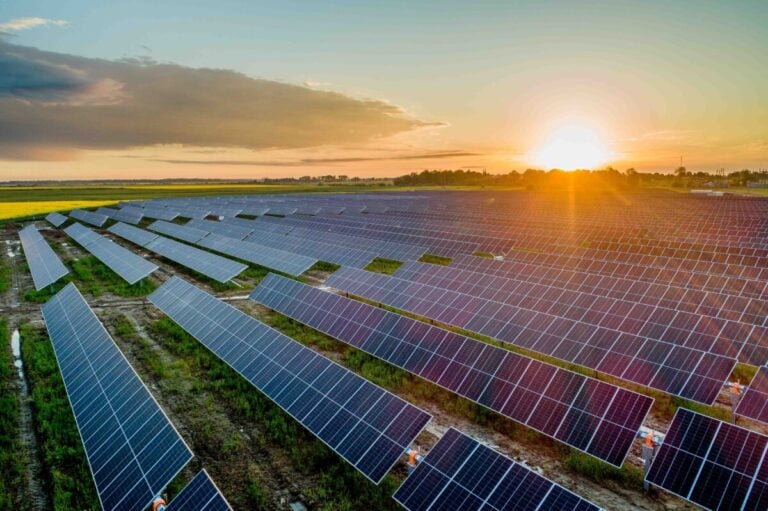In the 21st century, alternative energy sources are gaining increasing popularity. Thus, in 2023, alternative energy capacity increased by 50% compared to the results for 2022. According to the International Energy Agency, by 2030, global renewable energy capacity will increase by another 2.5 times. In this article I will talk about the pros and cons of solar energy in modern realities.
Areas of application of solar energy
Solar energy has a wide range of applications and is used in many areas:
Energy
One of the key areas where solar energy is used is electricity production.
Converting sunlight into electricity is possible thanks to solar panels. In doing so, the photovoltaic effect in solar panels converts light into electrical current, which can then be used directly or stored in batteries for later use.
Solar panels are installed on the roofs of buildings, on the ground, at specially designated sites for generating electricity. These can range from large-scale solar farms to small individual systems for home use.
Automotive industry
Solar energy can be used in the automotive industry to charge electric vehicles. Some cars are equipped with solar panels directly on the roof, which allows you to recharge the batteries even while driving. For example, in 2019, engineering students unveiled the Lightyear One, a solar-powered hybrid car.
Space industry
In space, solar panels are widely used to power spacecraft and satellites. They convert sunlight into electricity, which powers all systems on board.
Mobile devices
In some cases, solar panels are used to charge mobile devices such as smartphones, tablets and laptops. This is especially useful on hikes or expeditions when there is no access to electricity from an outlet.
Benefits of solar energy
- Wide range of applications: solar energy is used to provide electricity to various infrastructure facilities (including vehicles), acting as the main or additional source of electricity; used in heating systems; satisfies individual needs for water heating, etc.
- Environmentally friendly: The use of solar energy does not pollute the environment and does not produce greenhouse gases.
- Reducing dependence on finite natural resources: Using solar energy helps reduce dependence on oil, gas and other fuels.
- Economic Impact:Investing in solar energy creates jobs and helps reduce costs.
- Safe and Efficient: Solar energy is safe and has the potential to increase efficiency (coefficient of performance).
- No Wiring: Solar panels require no wiring, making installation easier and more convenient.
Disadvantages of solar energy
- Inconsistency: The disadvantage is instability at night and on cloudy days, but the ability to store energy can solve this problem.
- Seasonality: The amount of solar energy produced depends on the time of year.
- High initial investment: The initial cost of solar panels, associated equipment, and installation costs are quite high.
- Long payback.
Possibility of installing solar panels in remote or hard-to-reach regions

On the territory of the Russian Federation, the use of alternative energy sources (solar and wind generation) is included in the programs for the sustainable development of the heat and power complex at the legislative level. In particular, the introduction of this practice also applies to hard-to-reach regions and remote sites, where sunny weather prevails throughout the year. So, in the southern regions of Russia this seems promising.
In polar regions, in which part of the year is the Polar Night, the use of such sources of electricity, on the contrary, is unprofitable. At the moment, megawatt energy complexes in regions such as the Krasnodar and Stavropol Territories, as well as in the Republic of Kalmykia, already provide energy not only to individual facilities, but also to complex infrastructure facilities, including industrial ones.
Problems of recycling old solar panels
At the same time, in some cases, the battery is written off before its estimated service life. This may happen for the following reasons:
- Premature wear and aging. Panels are subject to wear and loss of efficiency over time. Failure to comply with operating conditions may speed up this process. If a solar panel stops generating enough energy or breaks down, its disposal becomes inevitable.
- Outdated technologies. The rapid development of solar cell technology is making previous models obsolete. Outdated panels may have low efficiency compared to innovative ones, making their use impractical.
Combination with other energy sources
The combined use of solar energy with other types of renewable and other energy is one of the most promising approaches in the energy sector. Solar energy can be effectively used in combination with other types of renewable energy, such as wind, hydropower, and others, such as nuclear and hydrogen.

The advantage of this combined approach is a more reliable and stable energy supply than using only one type. For example, wind and solar power plants compensate for each other at different times of the day and depending on the season, thereby reducing the risk of complete power failure at the site.
In addition, sharing solar energy with other sources can improve the economic efficiency of projects. In some cases, solar energy can be used to maintain system stability and reduce the burden on more expensive energy sources.
In general, the combined use of solar energy with other types of renewable and other energy helps to diversify the energy portfolio, increase the sustainability of the energy supply system and reduce negative environmental impacts.
The feasibility of using solar energy in various fields
The benefits of using solar energy in various fields are due to the advantages in economic, environmental and social aspects. First of all, solar energy is an inexhaustible source of energy, unlike traditional sources such as coal and oil.
Solar energy is available almost everywhere, ensuring stability of energy supply and reducing dependence on the availability of additional natural resources. Moreover, solar energy is a clean and environmentally friendly source of energy. During the generation of solar energy, there is no emission of harmful substances and greenhouse gases, which reduces the negative impact on the environment and helps combat climate change.
Thus, solar energy is highly adaptable to various applications. It can be used on many levels – from small scales (such as providing electricity to mobile devices or heating water for a private home) to large-scale projects (constructing large generating solar power plants).








